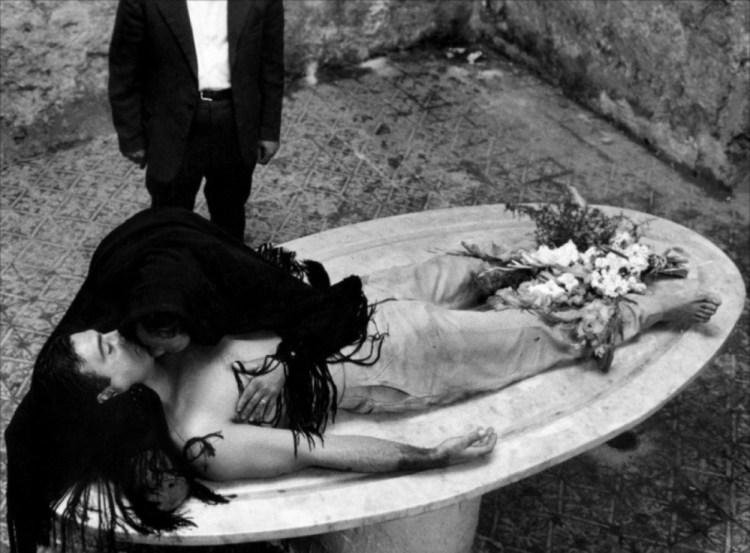This film, the story of Salvatore Giuliano, Sicily’s bandit-hero, by the esteemed Italian director Francesco Rosi, is the reason film festivals like this one exist, because without this kind of exposure, this marvelous, pre-“Godfather” movie would get lost.
Filmed in exquisite shades of black and white by Gianni Di Venanzo, it reminds us of Vittorio De Sica’s early films.
Salvatore, dubbed The Gentleman Bandit, embarked on his life of crime in the mountain villages of Sicily when a cop tried to stop him as he was stealing a loaf of bread. Shots were exchanged, and Salvatore fled to the mountains above his village, where a group of his childhood friends and assorted disenchanted and unemployed drifters joined him. His life then began to take on the same media sauce that flavored the adventures of Bonnie and Clyde, Al Capone, John Dillinger and Butch Cassidy and the Sundance Kid. The Sicilian police force, shamed by its inability to catch him, tacked every unsolved crime on his resume.
The heart of the Sicilian people is well known for its loyalty to its outliers, and the code of omerta (code of silence) reinforced its passion for the “Spaghetti Robin Hood,” who allegedly took from the rich and gave to the poor.
With his sexual charm and movie star looks, Salvatore’s fame grew around the world. He even made the cover of LIFE magazine.
The government would have loved to capture him and hang him in the public square, as they did Mussolini at the end of the war, but Salvatore’s mystique was loved by the Mafia, and he clearly had the love of the people of Sicily.
The movie — and it is a movie, not a documentary — tells the story of his involvement in 1945 with the Sicilian separatist movement that was engaged in a fight for Sicily’s independence. Salvatore’s bandits became partisans, the Pisciotti, and got into numerous gun battles with the Italian army, which was sent in to quell the rebellion.
When a deal was struck between Sicily and Italy, the corrupt separatist leaders, of course, abandoned Sal and even helped the Italians hunt him down.
It’s a story that bounces throughout history, from the ancient Romans to Mexico’s heroes Emiliano Zapata and Pancho Villa. Wherever there is a bandit hero, there is a loyal betrayer.
Giuliano’s Judas was his best and childhood friend Gaspare Pisciotta, who led the police in the dark of night to Salvatore’s safe house, and personally shot him there.
But the police felt slighted and wanted more public and international credit. And as in the case of Mexico’s Zapata, they created their own ugly reality.
For some reason, director Rosi never lets us get even a glance of the famous bandit king, except for a brief viewing on a slab in the morgue. Betrayer Pisciotta emerges as the central actor instead, played by American actor Frank Wolff.
Many stories, in magazines and articles out of Hollywood, have enlarged the Giuliano legend with tie-ins to Francis Coppola’s “The Godfather.”
Writer Mario Puzo’s follow up novel, “The Sicilian,” is a glamorized, dolled-up thriller about Salvatore, directed by Michael Cimino, with the unlikely assistance of Gore Vidal and starring Christopher Lambert. It comes not within a shotgun blast distance of the class act of Francesco Rosi’s film. Rosi’s resume is sparkling: “Christ Stopped at Eboli,” “Three Brothers,” and “Lucky Luciano.”
In “Salvatore,” Rosi shot his film in the actual locations of Giuliano’s life, on the rocky cliffs and dusty streets.
His cinematographer Di Venanzo, whose credits glitter with his work on Fellini’s “8 1/2,” and “Juliet of the Spirits,” shot the film in spell binding shades of deep black and glowing grays.
The peasant women in their black dresses and shawls move across the sun drenched cobblestones and into the blackness of the homes, pausing only to peer out at death that stalks their village. It’s breathtaking.
It’s clear that here, in this brilliant, dark Sicilian world, Martin Scorsese and Francis Coppola drew their inspiration for their work. At the end of Rosi’s inspired film, we can see Vito and Michael Coreleone coming, and the truth of F. Scott Fitzgerald’s line, “Show me a hero and I’ll write you a tragedy.”
J.P. Devine is a Waterville writer and former actor.
Send questions/comments to the editors.





Comments are no longer available on this story